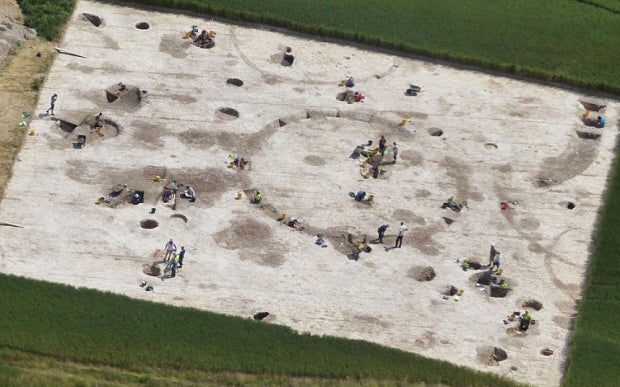Duropolis: The newly discovered Iron Age settlement that may be Britain's oldest town
The settlement dates back to 100BC

Archaeologists may have just discovered Britain's oldest town.
The Iron Age settlement in north Dorset, excavated by archaeologists from the University of Bournemouth, is thought to date back as far as 100 BC — that would make it 70 years older than Silchester in Hampshire.
The site at Winterborne Kingston - which has been dubbed 'Duropolis' after local tribe the Durotriges - was just a nondescript field of ploughed arable land, but the remains of 16 ancient roundhouses (with 200 in total thought to have once stood) suggests that hundreds of people lived in there more than 2,000 years ago. The town's discovery challenges long-held ideas about pre-Roman Britain. It was, for instance, previously thought that Iron Age Britons lived almost exclusively on hill-top forts like Maiden Castle in Dorset.
These strategic settlements, which were scattered across the country, were designed as a defence against enemy tribes.
Duropolis, however, indicates that unprotected towns uninvolved in conflict existed in the flatlands of Britain. It also provides fresh clues as to what happened to the people of Maiden Castle when they began to disperse in the 1st century BC.
Experts think the town was probably built during a period of peace, when once-warring tribes felt safe settling in open areas better fit for farming than fighting.
There are murmurings that the town may even be Dunium, which geographer Ptolemy referred to as the home of the Durotriges.
Paul Cheethham, the Bournemouth University archaeologist who co-directed the dig said: "It exposes the myth that everyone lived in protected hill forts – these inhabitants lived in this fertile farmland, away from the traditional hill forts we are all used to hearing about.
"What this suggests is that there are other big centres of occupation before the Roman arrival, this is a big open settlement, probably one of the first that the Romans encountered when they arrived."
Other things have turned up during the dig, including animal bone remains, quern stones used for grinding grain and spindle whorls for weaving.
It appears Duropolis, the oldest-planned town yet discovered in Britain, in which a range of industries and peoples thrived, was quite a busy place.
Subscribe to Independent Premium to bookmark this article
Want to bookmark your favourite articles and stories to read or reference later? Start your Independent Premium subscription today.

Join our commenting forum
Join thought-provoking conversations, follow other Independent readers and see their replies